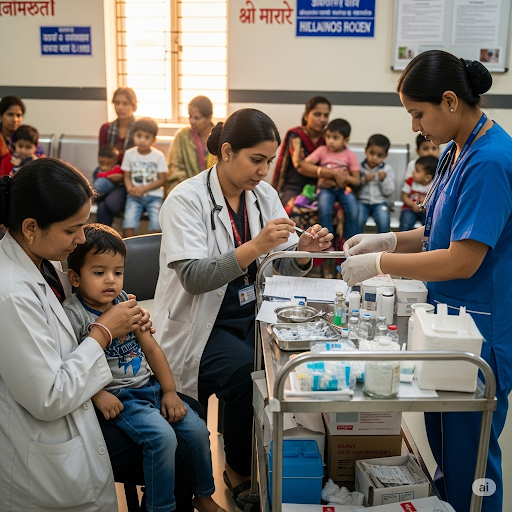Triple Protection MMR Vaccine
Safeguard against Measles, Mumps, and Rubella with one powerful vaccine. Proven safe and effective for over 50 years.
Understanding MMR Vaccination
The MMR vaccine is one of the most important immunizations for children and adults. Learn why protecting yourself and your family is crucial.
What is the MMR Vaccine?
The MMR vaccine protects against three serious viral infections: measles, mumps, and rubella. These diseases can cause severe complications including pneumonia, brain inflammation, deafness, and birth defects. The vaccine provides safe, effective protection against all three diseases.
- Measles : Highly contagious respiratory infection causing fever, cough, and rash
- Mumps : Viral infection causing painful swelling of salivary glands
- Rubella Causes birth defects if contracted during pregnancy
Important Statistics
- Before vaccination, measles killed 2.6 million people annually worldwide
- 1 in 1,000 measles cases develop brain inflammation (encephalitis)
- Mumps can cause permanent deafness in 1 in 20,000 cases
- Rubella during pregnancy causes birth defects in 85% of cases

Chickenpox Vaccination Schedule

12-15 Months
First MMR vaccination as part of routine childhood immunization

4-6 Years
Booster dose before school entry to ensure full protection

Catch-Up Vaccination
Adults born in 1957 or later who lack evidence of immunity should receive at least one dose. Healthcare workers, international travelers, and college students may need two doses.
Why Choose Bharat Vaccines for MMR Vaccine?
Expert Medical Professionals
Your vaccination will be administered by highly qualified healthcare providers who follow the latest medical guidelines for maximum safety and effectiveness.
Safe & WHO-Approved Vaccine
We use only certified, high-quality MMR vaccines recommended by the World Health Organization and national health authorities.
Hygienic & Comfortable Environment
Our clinic maintains strict hygiene protocols and ensures a comfortable experience for both children and adults.
Quick & Hassle-Free Process
From registration to vaccination, we ensure a smooth and efficient process with minimal waiting time.
Affordable & Transparent Pricing
We provide clear, upfront pricing with no hidden charges — making quality healthcare accessible to everyone.
Post-Vaccination Support
Our team offers guidance on aftercare and remains available for any follow-up questions or concerns.
Ready to Protect Your Child with MMR Vaccination?
Don’t wait – MMR vaccination (Measles, Mumps & Rubella) is most effective when given on schedule. Book your appointment today and give your child the protection they deserve.
Frequently Asked Questions
Get answers to common questions about MMR vaccination. Still have questions? Contact our medical team for personalized guidance.
Yes, the MMR vaccine is very safe. Serious side effects are rare. The most common side effects are mild, such as a low-grade fever or rash. The vaccine has been used safely for decades and has prevented millions of cases of measles, mumps, and rubella worldwide.
Most people have no side effects from the vaccine. When side effects do occur, they are usually mild and may include: fever (1 in 6 people), mild rash (1 in 20 people), swelling of glands in the cheeks or neck (rare). Serious side effects like severe allergic reactions are extremely rare (less than 1 in a million doses).
People who should not get MMR vaccine include: pregnant women, people with severe illness, people with weakened immune systems due to disease or medical treatment, people who have had a severe allergic reaction to a previous dose, and people with severe allergies to vaccine components.
No, your child cannot get measles, mumps, or rubella from the MMR vaccine. The vaccine contains weakened versions of the viruses that cannot cause the actual diseases but can trigger your immune system to build protection against them.
The MMR vaccine is highly effective. Two doses are about 97% effective at preventing measles, 88% effective at preventing mumps, and more than 97% effective at preventing rubella. This protection is expected to be lifelong for most people.
If your child misses their scheduled vaccination, contact your healthcare provider as soon as possible to reschedule. It’s never too late to catch up on missed vaccinations. The ‘catch-up’ schedule can help ensure your child gets protected as quickly as possible.
Yes, adults who were born in 1957 or later and don’t have evidence of immunity should get at least one dose of MMR vaccine. Some adults may need two doses, including healthcare workers, international travelers, and college students. Consult with your healthcare provider about your vaccination history.
No, there is no link between the MMR vaccine and autism. This has been thoroughly studied and debunked by numerous large-scale scientific studies. The original study that suggested this link was fraudulent and has been retracted. The MMR vaccine is safe and does not cause autism.
Most schools require MMR vaccination for enrollment unless there is a medical contraindication. Requirements vary by state and school district. Some allow religious or philosophical exemptions, but vaccinated children are much safer during disease outbreaks.
If you’re pregnant and not immune to rubella, you should avoid exposure to people with rubella. You cannot receive the MMR vaccine while pregnant, but you should get vaccinated immediately after delivery to protect yourself in future pregnancies and protect your newborn.
Studies suggest that MMR vaccine provides long-lasting immunity. Most people who receive two doses of MMR vaccine as children are protected for life. However, immunity can wane over time in some people, which is why healthcare workers and other high-risk individuals may need additional doses.
Yes, MMR vaccine can be given at the same time as other vaccines. Your child can receive MMR vaccine and other routine childhood vaccines during the same visit. Getting multiple vaccines at once is safe and helps ensure your child stays protected.
